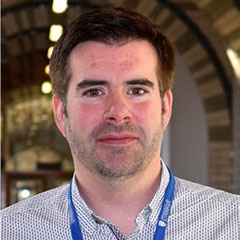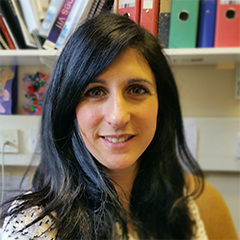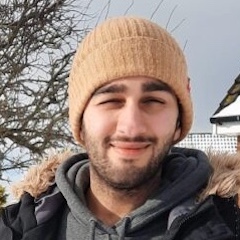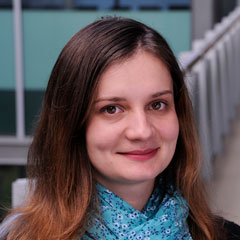Genetic Analysis of Population-based Association Studies
1–5 September 2025
Wellcome Genome Campus, UK
Learn the latest statistical methods and software for analysis of genetic association studies
Summary
This advanced course aims to give researchers involved in genetic disease studies a firm grounding in the use of the latest statistical methods and software for analysis of genetic association studies. This includes both small-scale disease-specific studies and large-scale collaborative projects including those that can be used for analysis of multiple complex traits such as UK Biobank.
The course will cover both theoretical and practical aspects of the design and analysis of such studies. Each topic will include a lecture followed by a practical session in which state-of-the-art statistical software will be applied to relevant datasets. The practical sessions will illustrate the ideas presented in the lectures. All the software used will be freely available so that skills learned can be applied after the course and, for the course, will be pre-installed on machines in the training room.
Learning outcomes
What will you achieve?
Upon completion of the course, participants can expect to:
- understand the general principles, assumptions and basic techniques used in genetic association studies
- read and comprehend scientific articles that present results from candidate-gene and genome-wide association studies
- analyse genetic data arising from candidate-gene and genome-wide association studies, (including quality control checks, association testing between genotype and phenotype, and post-association fine-mapping of implicated loci to point to likely causal variants, genes and pathways)
- perform imputation of variants that have not been directly genotyped, using information from genotyped genetic variants
- perform analysis of common and rare variants, accounting for population structure and family data
Programme
The programme will include lecture and computer-based practical sessions covering the following topics:
Introduction to genetic association studies
- Overview and history of genetic association studies leading up to and including genome-wide association studies
Basic association analysis and meta-analysis
- Single marker association tests (frequentist and Bayesian approaches)
- Calculation of odds ratios and relative risks
- Logistic regression
- Meta-analysis (fixed- and random-effects)
Quality control and population structure
- Data quality control procedures to avoid the generation of spurious false positives in association studies
- The confounding effects of population structure on association studies and methods for protecting against these effects
- Multivariate (principal components) and linear mixed modelling approaches to adjust for population substructure and relatedness in genome-wide association studies
Haplotype estimation and genotype imputation
- Methods for genotype imputation using publicly available reference panels
- Pre-phasing of haplotypes and imputation based on these inferred haplotypes
- Frequentist and Bayesian methods of testing association at imputed SNPs and indels
- Quality control for imputed SNPs
- Meta-analysis using imputed data
Fine-mapping
- Methods to identify distinct association signals
- Fine-mapping causal variants and construction of credible sets
- Leveraging diverse populations for fine-mapping through multi-ancestry meta-analysis
Analysis of rare variants
- Methods for analysing rare variants from re-sequencing, genotyping and imputation studies via “collapsing approaches”
- Burden and dispersion tests of association
Mendelian randomisation
- Concepts behind using genetic variants for causal inference in epidemiology
- Descriptions of the assumptions, limitations and sensitivity analyses of Mendelian randomisation
- Practical session to apply the above and reproduce examples from the literature
Introduction to post-GWAS interrogation
- Approaches to integrate genome-wide association signals with multi-omics to understand disease biology
Lectures are followed by practical sessions using realistically sized datasets so that students learn how to apply the theory. Students will use a variety of computer programs during the course including: IMPUTE2, SHAPEIT2, SNPTEST2, META, GCTA, FaST-LMM, PLINK, SAIGE, R
The programme will also include seminars from internationally renowned researchers from the field of complex disease genetics, along with opportunities for participants to discuss their own research projects with course instructors and with each other.
Instructors and speakers
Training Team

Svetlana Cherlin
Newcastle University, UK

Heather Cordell
Newcastle University, UK

Gibran Hemani
University of Bristol, UK

Andrew Morris
University of Manchester, UK

Gisela Orozco
University of Manchester, UK

Nik Tzoumas
Newcastle University, UK
Guest Speakers

Karoline Kuchenbaecker
UCL, UK

Frank Dudbridge
Professor of Statistical Genetics, Genetic Epidemiology Research Group, University of Leicester UK
Wellcome Connecting Science - Learning and Training

Alice Matimba
Head of Training and Global Capacity

Vaishnavi Vikas Gangadhar
Informatic Technical Officer

Monica Abrudan
Informatics Education Developer

Nicola Stevens
Event Organiser

Martin Aslett
Informatics Manager
How to apply
Prerequisites
The course is open to scientists and clinicians/healthcare professionals engaged in relevant research. To ensure participants benefit fully from the course, applications should include clear evidence of the following existing knowledge and experience:
- A strong quantitative background (including some familiarity with statistics, mathematics or bioinformatics).
- A reasonable level of computer literacy.
- A basic knowledge and understanding of genetics (both molecular genetics and concepts of inheritance/heritability).
Bioinformatic training will include the use of Linux/UNIX command line and use of the R programming language. Thus, familiarity with these resources is recommended. With this in mind, ‘Introduction to Linux for biologists’and ‘Introduction to R’ pre-course materials willl be provided.
How to Apply
- Start the application
- Click on the “Apply” button above to start your application. Please note that places are limited and will be awarded based on merit.
- Demonstrate the course’s relevance to your project/role
- Our courses are highly subscribed, so it is essential to clearly show how the skills you will learn in the course will be directly applicable and beneficial to your current role/project and how do you plan to disseminate the knowledge after the course.
- Preference will be given to applicants who are currently working on related projects or soon will be.
- Add any other relevant information {delete if not necessary}
- Letter of recommendation
- Applications must be supported by a recommendation from a scientific or clinical sponsor (e.g., supervisor, line manager, or head of department). Ensure that your sponsor provides a tailored supporting statement by the application deadline. This statement must be uploaded as a PDF document to the registration system within your application. Applications without a supporting statement will not be considered.
- Need help?
- If you encounter any problems with the online application process, please contact us at courses@wellcomeconnectingscience.org for assistance.
Application deadline: 6 May 2025
Travel visas
Citizens of many countries can travel to the UK to attend a course or conference without needing a visa. Please check the UK government website for visitor information: https://www.gov.uk/standard-visitor.
Confirmed attendees requiring a letter to support a visa application should contact us at courses@wellcomeconnectingscience.org.
Cost and financial assistance
| Cost | Accommodation/meals | |
| *Course fee | £ 863 | includes accommodation and all meals |
*The course fee is subsidised by Wellcome Connecting Science.
Reduced rates are available for those who do not require accommodation, please contact us for more information. Please be aware that the campus is based in a rural location and this option is only suitable for attendees who are already based locally and have access to private transport.
Contact us at courses@wellcomeconnectingscience.org for the commercial rate.
The fee will be requested once acceptance is confirmed.
Bursaries
Limited bursaries are available (up to 50% reduction on the course fee only, this does not include travel costs) and are awarded on merit. If you would like to apply for a bursary, please complete the bursary section of the online application form, explaining why you would benefit from funding.
Bursaries can be applied for as part of the course application form. Applicants will be notified of a bursary award along with their place on the course, usually within one month of the application deadline. The decision of the selection committee is final.
Please note that both the applicant and sponsor are required to provide a justification for the bursary as part of the application.
Deadline: 6 May 2025
Additional funding opportunities
Visit our support page for additional financial support currently available.
Extra accommodation
If you wish to book onsite accommodation either side of the course dates, please contact Hinxton Hall Conference Centre directly.
Accommodation services phishing scam – please be vigilant. More information.
Testimonials
Feedback from the 2024 course:
“Brilliant content and super useful for pursuing my PhD studies. Instructors were patient, friendly and approachable and highly knowledgeable! Thank you.”
“I gained a clear understanding of the theory behind most genetic analysis techniques. I also
got a practical training on genetic analysis techniques I was interested in such as qc,
Bayesian fine mapping, SAIGE and MR.”
“Learned so many things applicable to my own research”
“I enjoyed the course throughly academically and socially.”

